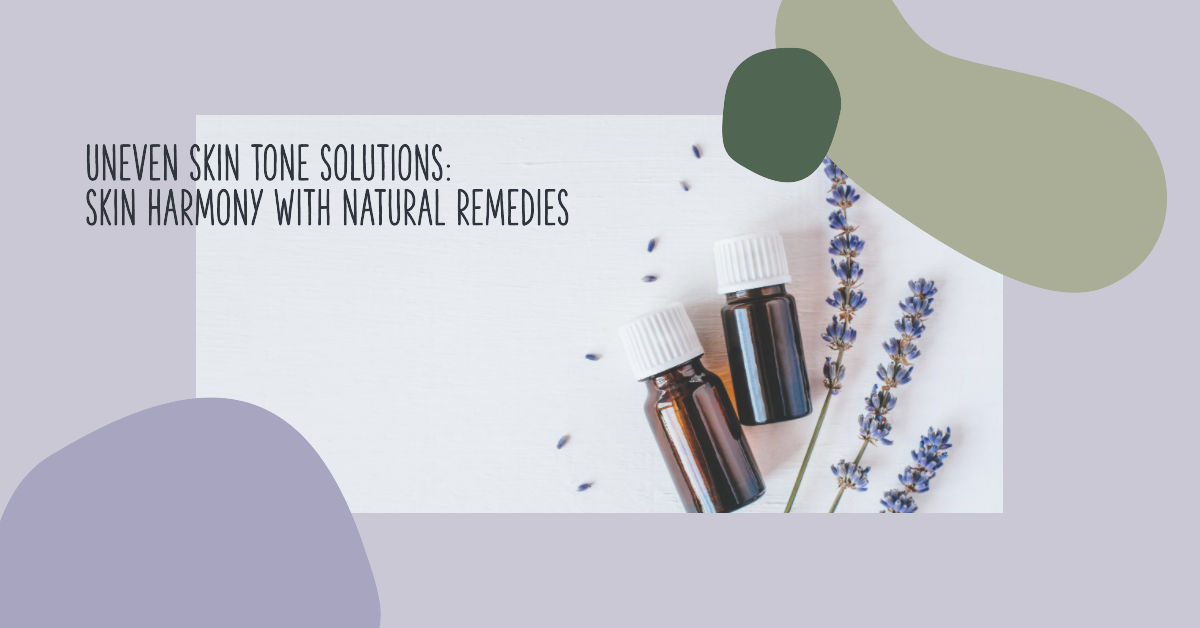Uneven skin tone, a common skincare concern, can be a source of frustration and self-consciousness for many. Whether caused by sun exposure, hormonal changes, or other factors, addressing uneven pigmentation is a priority for those seeking a radiant complexion. Fortunately, natural remedies offer promising solutions for achieving a more even skin tone. In this article, we will explore various ways to combat uneven skin tone and improve pigmentation, focusing on effective, science-backed treatments you can incorporate into your skincare routine.
In This Article
- 1 Understanding Uneven Skin Tone
- 2 The Importance of Achieving Even Skin Tone
- 3 Natural Remedies for Uneven Skin Tone
- 4 Incorporating Essential Oils into Your Skincare Routine
- 5 Herbal Remedies for Even Skin Tone
- 6 Lifestyle Changes for Maintaining Skin Harmony
- 7 Potential Risks and Precautions
- 8 When to Consider Professional Treatments
- 9 Combining Natural Remedies with Medical Interventions
- 10 Conclusion and Takeaways
Understanding Uneven Skin Tone
Before diving into the remedies, let us understand what uneven skin tone really means. Uneven skin tone refers to the irregular distribution of melanin, the pigment responsible for the colour of your skin. When melanin production becomes uneven or excessive in certain areas, it can lead to dark spots, blemishes, and an overall lack of uniformity in your complexion.
The Importance of Achieving Even Skin Tone
Achieving an even skin tone is not just about aesthetics; it is also crucial for maintaining healthy skin. Uneven pigmentation can make you more susceptible to the harmful effects of UV radiation, which can accelerate the aging process and increase the risk of skin cancer. Moreover, it can affect your self-esteem and confidence.
Natural Remedies for Uneven Skin Tone
Natural remedies offer a holistic approach to improving pigmentation and promoting healthier skin. Let us explore some effective treatments you can try at home:
- Lemon Juice for Skin Brightening: Lemon juice contains natural acids that can help lighten dark spots and even out your skin tone. Mix lemon juice with water, apply it to affected areas, and leave it on for 10-15 minutes before rinsing off.
- Turmeric for Reducing Hyperpigmentation: Turmeric, with its anti-inflammatory and antioxidant properties, can help reduce hyperpigmentation. Create a paste by mixing turmeric with yogurt or honey and apply it as a mask.
- Aloe Vera for Soothing Uneven Skin: Aloe vera is renowned for its soothing properties. Apply fresh aloe vera gel to your skin to calm irritation and reduce redness, promoting a more even complexion.
- Honey as a Natural Moisturizer: Honey is a natural humectant, which means it helps lock in moisture. Keeping your skin well-hydrated can improve its overall appearance and reduce the prominence of uneven pigmentation.
Incorporating Essential Oils into Your Skincare Routine
Essential oils can also play a pivotal role in achieving even skin tone:
- Lavender Oil for Skin Healing: Lavender oil is known for its skin-healing properties. Dilute a few drops with a carrier oil and apply it to the affected areas to promote skin repair and even out pigmentation.
- Tea Tree Oil for Acne Marks: Tea tree oil’s antibacterial properties make it effective in addressing post-acne marks and blemishes. Apply it sparingly to troubled spots for targeted treatment.
Herbal Remedies for Even Skin Tone
In addition to essential oils, consider incorporating herbal remedies into your skincare regimen:
- Herbal Teas and Infusions: Drinking herbal teas like green tea and chamomile can provide antioxidants that combat free radicals, helping to maintain a healthy complexion.
- Herbal Face Masks and Serums: Homemade masks and serums with ingredients like rosehip oil, licorice root extract, and ginseng can work wonders in improving skin tone and texture.
Lifestyle Changes for Maintaining Skin Harmony
Achieving and maintaining an even skin tone also involves making some lifestyle adjustments:
- Sun Protection and Its Impact on Pigmentation: Protecting your skin from harmful UV rays through sunscreen and protective clothing is essential. UV exposure is a significant factor in the development of uneven pigmentation.
- The Role of Stress Management: High stress levels can exacerbate skin issues. Practicing stress-reduction techniques like meditation, yoga, and deep breathing can help keep your skin in balance.
Potential Risks and Precautions
While natural remedies are generally safe, it is important to be aware of potential risks:
1. Skin Sensitivity and Allergies:
When addressing the issue of uneven skin tone, it is crucial to acknowledge that not all remedies work equally well for everyone. Skin sensitivity and allergies are common concerns when using natural treatments. People with uneven skin tone often have varying degrees of sensitivity, and certain natural ingredients may trigger adverse reactions. To navigate this challenge effectively, it is essential to be aware of potential risks and take precautions.
Transitioning into the discussion of precautions, it is important to note that a proactive approach can help mitigate these risks.
2. Patch Testing and Consultation with a Dermatologist:
Before diving headfirst into any new skincare regimen, especially when dealing with uneven skin tone, it is advisable to conduct a patch test. This simple yet invaluable step involves applying a small amount of the product or remedy to a discreet area of your skin, such as the inside of your wrist or behind your ear. By doing so, you can assess how your skin reacts before applying the treatment to your entire face.
If you experience redness, itching, burning, or any discomfort during the patch test, it is a clear indication that the product may not be suitable for your skin. In such cases, it is best to discontinue use immediately and explore alternative remedies.
However, even with patch testing, some individuals may still experience adverse reactions. This underscores the importance of seeking professional guidance when dealing with stubborn uneven skin tone.
3. Natural Remedies vs. Medical Treatments:
Uneven skin tone can vary widely in severity and causes. While natural remedies can be effective for mild cases and preventive care, they may fall short when it comes to more stubborn or complex pigmentation issues. This is where the distinction between natural remedies and medical treatments becomes crucial.
In cases of stubborn uneven pigmentation, medical treatments like chemical peels or laser therapy may be necessary. These procedures should be discussed with a dermatologist or skincare specialist to determine the most suitable course of action.
When to Consider Professional Treatments
Professional treatments administered by dermatologists or skincare specialists offer advanced solutions for uneven skin tone. If your condition is severe, persistent, or associated with medical concerns, it’s advisable to seek professional help. Some professional treatments for uneven skin tone include:
- Chemical Peels: Dermatologists can use chemical peels to remove the top layer of skin, which can help reduce pigmentation issues [1].
- Laser Therapy: Laser treatments target melanin in the skin and can be effective in treating various forms of pigmentation [2].
- Microdermabrasion: This procedure involves exfoliating the skin to improve texture and even out skin tone [3].
- Prescription Medications: In some cases, dermatologists may prescribe topical medications that are more potent than over-the-counter remedies [4].
- Cryotherapy: This involves freezing areas of hyperpigmentation with liquid nitrogen [5].
Combining Natural Remedies with Medical Interventions
It is important to note that natural remedies and professional treatments are not mutually exclusive. In fact, in many cases, they can complement each other effectively.
For instance, after undergoing a professional treatment, you can maintain and enhance the results by incorporating natural remedies into your daily skincare routine. Natural ingredients like aloe vera, green tea extracts, and antioxidants can help soothe the skin, reduce inflammation, and prevent further pigmentation issues.
Conclusion and Takeaways
Managing uneven skin tone involves understanding potential risks and taking appropriate precautions, including patch testing to identify natural remedy compatibility. For severe cases, consulting a dermatologist is crucial to explore professional treatment options. Combining natural remedies with medical interventions offers a holistic approach to achieving a radiant complexion.
Achieving even skin tone is possible through natural remedies and lifestyle adjustments. Incorporating these remedies into your skincare routine and practicing sun protection can significantly improve pigmentation and enhance your complexion. Consistency is vital in your skincare journey, and if you have concerns, do not hesitate to seek professional advice.
Related: Kojic Acid for Hyperpigmentation: A Proven Treatment











